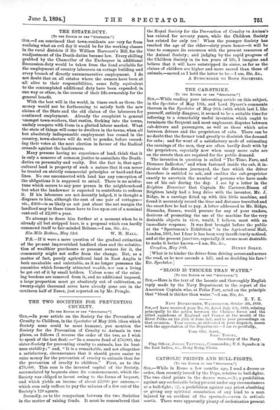THE ESTATE-DUTY.
[To THE EDITOR OP THE " SPEOTLTOR...]
am convinced that town-residents are very far from realising what an evil day it would be for the working classes in the rural districts if Sir William Harcourt's Bill, for the readjustment of the Death-duties became law. Every shilling .grabbed by the Chancellor of the Exchequer in additional Succession-duty would be taken from the fund available for the employment of country labourers on cottage building and -every branch of directly unremunemtive employment. I do not doubt that on all estates where the owners have been at all alive to their responsibilities, sums fully equivalent to the contemplated additional duty have been expended, in -one way or other, in the coarse of their life-ownership for the general benefit.
With the best will in the world, in times such as these, the money would not be forthcoming to satisfy both the new claims of the State and the old claims of the labourers for -continued employment. Already the complaint is general 4tmongst town-workers, that rustics, flocking into the towns, 'unduly compete with them in a glutted labour market. What the state of things will come to dwellers in the towns, when all but absolutely indispensable employment has ceased in the country, town-electors will do well to ponder, before record- ing their votes at the next election in favour of the Radical -crusade against the landowners.
Many persons having no experience of land, think that it is only a measure of common justice to assimilate the Death- -duties on personalty and realty. But the fact is, that agri- -miltural land is property of such a nature that it can never be treated on strictly commercial principles or hard-and-fast lines. No one unconnected with land has any conception of the obligations it is supposed to entail. There is no misfor- tune which occurs to any poor person in the neighbourhood but what the landowner is expected to contribute to redress it. If his labourers are not decently lodged, it is thought a 'disgrace to him, although the cost of one pair of cottages— viz., f460—is as likely as not just about the net margin the ‘landlord may in these times have to live upon out of a nominal .rent.roll of £2,000 a year.
To attempt to fleece him further at a moment when he is -already all but stripped bare, is a proposal which can hardly -commend itself to fair-minded Britons.—I am, Sir, &c., P.5.—If it were a mere question of the gradual extinction -of the present impoverished landlord class and the substitu- tion of wealthier purchasers or peasant owners for it, the -community might not suffer from the change. But, as a matter of fact, purely agricultural land in East Anglia is both unsaleable and unlettable, as it no longer possesses the amenities which formerly attracted wealth, nor can a living be got out of it by small holders. Unless some of the exist- ing burdens are removed from it, and no additional imposed, -a large proportion must go absolutely out of cultivation, as twenty-eight thousand acres have already gone out in the 'southern half of Essex, just reported on by Mr. Pringle.






































 Previous page
Previous page